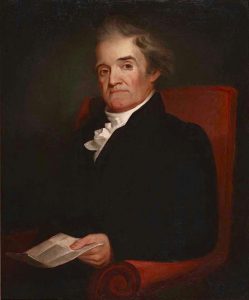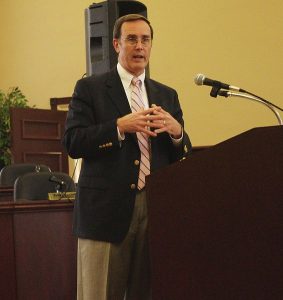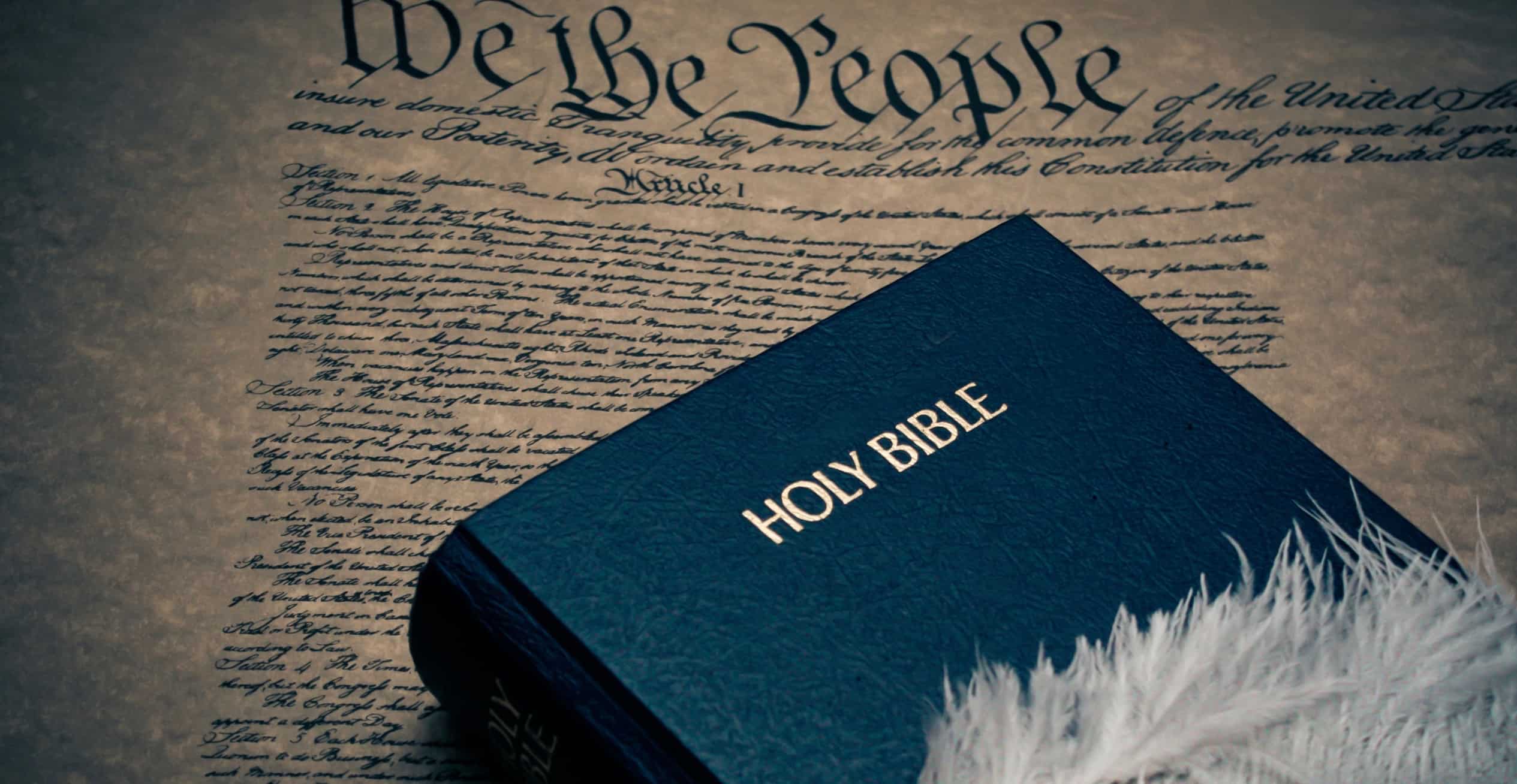A Call to Return to Bedrock Principles
The act of uniting a man and a woman for life; wedlock; the legal union of a man and woman for life. Marriage is a contract both civil and religious, by which the parties engage to live together in mutual affection and fidelity, till death shall separate them. Marriage was instituted by God himself for the purpose of preventing the promiscuous intercourse of the sexes, for promoting domestic felicity, and for securing the maintenance and education of children.
Marriage is honorable in all and the bed undefiled. Heb 13
—Founding Father Noah Webster, defining the word marriage in his classic and comprehensive dictionary, An American Dictionary of the English Language, 1828 edition—
Key point: Marriage as it has been redefined by the Supreme Court positions the state against the God-ordained institutions of marriage and the family, and consequently, against God Himself. In such a conflict, Christians must choose whether they will follow the state’s definition of marriage or God’s.
- A condensed version of this article is available here.
- Go here for summaries of all the articles in this series.
Myth #14: Same-sex marriage has implications for the same-sex couple only, and not for others. “If don’t agree with same-sex marriage,” we were told, “don’t worry. “Changing the definition of marriage won’t affect you!”
Fact: Changing the definition of marriage to include same-sex as well as opposite-sex couples totally alters the nature of marriage in the eyes of government and in the eyes of society. The implications for families are ominous—even those who, for all the right reasons, firmly hold that marriage is what God and nature have declared it to be.
Many scholars contend that Noah Webster’s 1828 American Dictionary of the English Language is “the finest English dictionary ever published.” It’s definition of marriage, which is printed above, is enlightening not only with regard to the definition itself—what marriage really is—but also with regard to the perspective on marriage held in the days and years when the United States of America still was putting down its roots as a nation.
Also very telling are the dictionary’s definitions of the words masculine and feminine.
Masculine:
1. Having the qualities of a man; strong; robust; as a masculine body.
2. Resembling man; coarse; opposed to delicate or soft; as masculine features.
3. Bold; brave; as a masculine spirit or courage.
Feminine:
The first syllable may be and probably is from wemb or womb, by use of the f for w; the b not being radical [not belonging to the root of the word]. The last part of the word is probably from man, quasi, femman, [hence] womb-man.
1. Pertaining to a woman, or to women, or to females; as the female sex.
2. Soft; tender; delicate. Her heavenly form angelic, but more soft and feminine
3. Effeminate; destitute of manly qualities.

These definitions undoubtedly will sound outdated to many today, but hopefully they will sound refreshing to many others. Founding Father Noah Webster was in touch with reality!
Do not misunderstand. I’m not saying that a man can’t ever be tender or that a woman can’t ever be strong. Yet, even with all the cultural confusion surrounding gender issues today, when we contrast the two sexes in a general way, noting their characteristics and their differences, we see that Noah Webster was right on target. He knew what masculinity, femininity, and marriage were, and are.
Again, the definition of marriage in Webster’s 1828 dictionary is as follows.
The act of uniting a man and a woman for life; wedlock; the legal union of a man and woman for life. Marriage is a contract both civil and religious, by which the parties engage to live together in mutual affection and fidelity, till death shall separate them. Marriage was instituted by God himself for the purpose of preventing the promiscuous intercourse of the sexes, for promoting domestic felicity, and for securing the maintenance and education of children.
Marriage is honorable in all and the bed undefiled. Heb 13
Definitions Matter
On June 26, 2015, the Supreme Court of the United States changed the definition of marriage nationwide to include same-sex couples. From a legal perspective, a scant majority of Supreme Court justices didn’t change marriage a little bit or even a lot. Instead, they reshaped it completely, altering the very nature of the institution from the inside out. In other words, the Supreme Court recreated marriage to make it mean something diametrically opposed to what it always has meant, and what it means inherently when one man and one woman—one, and only one, of each sex—come together to be united for life and to form a new family. Thus, the change wasn’t one of degree, but of kind.
The Supreme Court’s redefinition of marriage didn’t change marriage in terms of degree; rather it established a new kind of institution we still call marriage. But it isn’t marriage at all.
In a previous post, I wrote that the Supreme Court’s redefinition of marriage actually denies what it means
to be a human being. Natural man-woman marriage, you see, affirms what being a human being is all about. This is not to say that single people or homosexual individuals aren’t human; of course they are! It is to say that natural marriage affirms what being human means. Same-sex “marriage” doesn’t just distort that affirmation; it eliminates it—because if two men or two women can marry each other and have exactly what one man and one woman married to each other have (this notion obviously is a lie), marriage has nothing to do with sex, procreation, children, fatherhood, motherhood, male-female dynamics in a relationship, or anything else that truly makes marriage what it is, and that makes being a human being what he or she is.

Well, does the revised definition of marriage really eliminate the dynamic of male-female differences from the institution of marriage? In the eyes of the government, the answer is yes. Christians desperately need to understand the implications of this for the family and for society as a whole.
Former Tennessee state senator and Family Action Council of Tennessee President David Fowler has seriously considered this matter. In a series of five short articles he articulates the problem, the need, and the challenge that lies before supporters of man-woman marriage. Here are links to those articles and a brief summary of the issues he highlights.
- Are Tennessee’s Evangelical Pastors Licensing Same-Sex ‘Marriages’? (Feb. 16, 2018; original link) Pastors, and many Christians as well, have tended to think that post-Obergefell, opposite-sex marriages and same-sex marriages remain very different. In a practical sense they are correct, because no same-sex couple—married or not—ever can have what an opposite sex couple has. Yet in a legal sense they are wrong: a heterosexual marriage in the eyes of the government is a relationship identical to a same-sex marriage! Are pastors who are performing wedding ceremonies for heterosexual couples tacitly lending their support to marriage redefined? They need to consider this issue very carefully.
- Should Christian Couples Get Legally Married? (Feb. 22, 2018; original link) Just as pastors who officiate wedding ceremonies need to think long and hard about whether they should perform state-recognized marriages, so should a heterosexual Christian couple considering marriage also ask if they really want their marriage to be defined by the state.
- How Long Before Parents Have to be Licensed by the State? (March 1, 2018; original link) If marriage no longer is at all about male-female differences in the eyes of the state, then biological parents no longer can make the point that their genetic ties to their children give them any special rights as parents. Just ask a couple in Ohio who, in late February, lost custody of their 17-year-old daughter who desires to become a male through hormone treatment. How can a judge make such a ruling? According to Fowler, what happened “shouldn’t really shock anyone, given that the following was the very first sentence in the Supreme Court’s decision on same-sex ‘marriage,’ Obergefell v. Hodges: ‘The Constitution promises liberty to all within its reach, a liberty that includes certain specific rights that allow persons, within a lawful realm, to define and express their identity.'” Do you now see how marriage redefined can mean parental rights obliterated? In the eyes of the government, heterosexual couples—even those who are biological parents—are identical to same-sex couples who have no innate ability to reproduce.
In the eyes of the government, heterosexual couples—even those who are biological parents—are identical to same-sex couples who have no innate ability to reproduce.
- A Really Hard Question: What Is Marriage Worth to You? (March 9, 2018; original link) What should Christians and other supporters of natural marriage do when the state says marriage is something that it absolutely is not? Do couples have the right to marry without state approval? Yes. These marriages are called common law marriages, and they have been deemed legitimate by the Supreme Court. Common law entails the principle that there is a form of law that predates civil government and that civil government merely acknowledges. So a common law marriage is one not grounded in a statute by which civil government gives its “permission” for a marriage. According to the Supreme Court, most of the early marriage laws in America were not conferring on a couple the right to marry, but allowing them to register marriage and provide evidence to third parties of the marriage. The common law does not recognize any same-sex relationship as a marriage; it sees marriage as solely a heterosexual, 2-person union. Be forewarned! Were a state to adopt common law with regard to marriage, get ready for intense LGBT pressure, including severe economic blackmail, against that state. Were this to happen in your state, where would you stand?
- What Are Inalienable Rights and Liberty Worth to You? (March 16, 2018; original link) Our form of government rests upon a foundation that includes the principle “that all men are created equal, that they are endowed by their Creator with certain unalienable rights, that among these are life, liberty and the pursuit of happiness.” Is the right to marry also one of those rights, or is it a right that comes from and can be adjusted and changed by government and government alone? When the Supreme Court insisted that states cannot deny same-sex couples the “right” to marry, it essentially said to them they are beholden to the Court’s interpretation of the Constitution and that no law is higher. Marriage, however, was instituted by God and predates the Supreme Court, Congress, the US Presidency, and, for that matter, the United States of America itself! As a matter of fact, the institution of marriage predates any and all governments. Are we willing to push back against the Supreme Court on this matter? If we’re not willing to push back on the issue of marriage, will we be willing to push back on any issue? Where do you stand?
So, anyone who says, Hey, if you don’t agree with same-sex marriage, make sure you don’t have one! is sorely misled—and misleading others. Same-sex marriage affects us all! Let’s make sure we’re ready to resist in the most Christlike and effective of ways.
The future of liberty depends on it!
Part 9 is available here.
Copyright © 2018 by B. Nathaniel Sullivan. All rights reserved.
Listen to the latest (March 21, 2018) FACT Report — “Are Inalienable Rights Dead?” — from the Family Action Council of Tennessee.
top image credit: www.lightstock.com
image credit: David Fowler


Very interesting points. Thank you
Thank you, Deborah. Many of these implications are not readily seen, but I hope people will become more fully informed. With government’s perspective on marriage having profoundly changed, people and society are being affected, and will be affected—also profoundly. I’m grateful for David Fowler’s insights and his efforts to help those who believe in natural marriage push back.